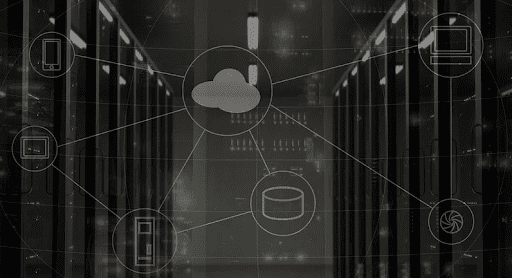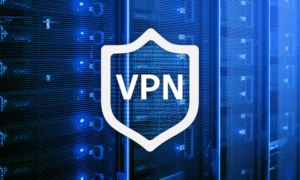In today’s article, I’ll explain better what VPN is, what it’s for, and how it can bring more security to our connections.
VPN is the abbreviation for Virtual Private Network.
This network is the technology that establishes the communication between your machine and the internet, but unlike standard networks, VPN determines secure communication by encrypting the transmitted data.
Basically, VPN creates an encrypted tunnel so that your machine can access the internet without your provider being able to record your activities.
With a VPN, your browsing is anonymous and untraceable. The VPN serves, fundamentally, to guarantee data protection and establish safe virtual browsing.
Other uses for a VPN are to change your IP location, access blocked websites in your country, protect your privacy and increase your security when accessing the internet through public wi-fi networks, for example.
VPN is also a feature widely used by companies that need to protect their data when communication between remote points and the technology matrix is required. The VPN can also be used on android with the help of official VPN Apps for Android.
Is it safe to use VPN?
There are different companies that offer VPN services, and there are different protocols for connecting to a private network.
Paid VPNs are generally more secure than free ones. This is because, when using a free service, it is not possible to guarantee that the data collected by that service will not be sold or distributed to other companies.
Pay networks also tend to have superior connection quality and less impact on browsing speed.
How does VPN work?
Quite simply, VPN works by building a kind of tunnel between your machine or device and the internet. Through this tunnel, information is transmitted anonymously and privately and without the possibility of being intercepted by hacker invasions.
I will explain in more detail for better understanding:
When you visit a website or app, your machine or smartphone connects to a provider, informing them that you want to access a particular website or app.
It is this provider that communicates with the internet and returns information to your machine, thus enabling you to view these pages.
All activities you do within this network, however, are traceable and are recorded by this provider. It is also in this way that websites are able to demographically map who their visitors are and extract other analytics data.
Imagine that all this communication, in addition to being traceable, happens openly and can eventually be invaded during some data transmission.
When accessing the internet connected to a VPN, the only information your provider will have is that you are connected to a remote server, which can be located anywhere in the world, and nothing else.
All your steps from the moment you connect to this server will be protected, and all data provided will be preserved under encryption and will be transmitted through this tunnel that will isolate them from possible intrusions.
No VPN
Roughly speaking, without a VPN your internet connection is unsecured and your ISP knows everything you do while browsing.
This is because your IP address, which serves to identify your machine, will be provided to the providers and all activity will be linked to it.
With VPN
On the other hand, with a VPN, your IP address will be hidden and the only IP providers will be able to see is the IP of the remote server you are connected to. This IP address is shared by numerous users and changes regularly.
Proxying
A proxy is also an intermediary between the user and the internet and can often be confused with a VPN.
The difference between the two is that the proxy passes all the necessary information to the website requested by the visitor when he accesses the internet, such as the IP address of a specific machine’s proxy; while VPN passes only the IP of the remote server used.
A VPN acts as an online proxy that allows a user to browse anonymously.
Authentication
Authentication is the process by which the VPN client and the remote VPN server ensure that they are only talking to each other in a completely safe way.
Tunneling
Tunneling is what we call the method by which a data packet is encapsulated to be sent to the ISP. VPN encrypts this data before transmitting it, preventing third parties from being able to understand it.
Cryptography
Encryption is the practice of encrypting data so that it is only assimilated by the specific destination to which it is being sent.
In the case of VPNs, the data sent to the internet provider is encrypted so that the information sent by a user cannot be tracked or intercepted by intrusions.
Encryption of this data protects them and can only be decrypted by the requested provider.
What are VPN protocols?
A VPN protocol is a method by which your machine or device will connect to the server on a private network. What changes from one protocol to another are encryption standards, authentication procedures, speed, and so on.
Among the most common VPN protocols on the market are OpenVPN, IKEv2, Lightway, WireGuard, SSTP, PPTP, among others.
To choose the best protocol for your navigation, you need to define what you want to prioritize in this navigation.
Protocols impact, for example, the speed of your connection, so some of them are more suitable for those who want to download.
Why use VPN?
There are numerous reasons that advocate for the use of VPN, whether for a business or for the personal use of home connections. I will detail the most common ones below.
For your safety
Protecting the security of your data is often the first reason to adopt regular use of a private network.
A VPN can provide more security and peace of mind for those who work with large data flows or simply want to raise security standards inside their home.
Protect your privacy
For many people, protecting their privacy online may seem like overkill, but the truth is that taking some precautions should not be a secondary task.
Extracting and selling private data from millions of users is one of the biggest products traded behind the scenes of the internet today, and if you don’t want to have information about your browsing floating around, a VPN can help.
By masking your IP address, the remote server you are using to browse the internet through a VPN prevents your virtual activities from being tracked, thus protecting your privacy when making purchases or accessing apps that contain personal information.
Access websites blocked or censored by firewall
Due to legal differences, it is common that some sites are banned in certain countries, such as Google is banned in China; or some artistic content is not accessible worldwide for various reasons.
A VPN can circumvent this type of prohibition because, when connecting to a remote server in the US, for example, the IP address transmitted to your internet provider will be hosted in the US, allowing you to access all content available in that country.
If you want to access a page that is not available in your country, just choose a server hosted in the country where this content is available.
Firewall-censored sites are also allowed access via a VPN.
To change your location
As stated above, a VPN changes the location of your IP, making an internet provider understand that your browsing originates in another country.
If for any reason you need to access an online service from another location, using a private network is your solution.
When to use a VPN?
Even if you don’t want to make recurrent use of a VPN to use the internet every day, certain situations require a greater concern with the security of your data.
Public wifi
Connecting your device to public Wi-Fi can be a lot of data interception.
If you need to work remotely or use a public Wi-Fi network to perform some activity, it is highly recommended that a VPN protects your browsing.
To use a private network on your smartphone, look for an app that makes this bridge and has this feature always at hand.
Traveling
If you are traveling and need to connect to hotel Wi-Fi networks, access websites that are unavailable in certain countries, or simply want to protect your privacy by hiding your location, using a VPN is a must.
With it, you surf the Internet through a private network anywhere in the world, including the country you live in outside of it.
Watching streaming
Have you ever tried to follow your favorite series abroad and found its unavailability? If you are in the habit of traveling frequently, probably already.
Solving this problem with a VPN is very simple. Just access a remote server hosted in your country of residence and return to the streaming site to have access to all content available in your country.
If you want to listen to music or watch a movie blocked in your country, the opposite is also valid: just look for a server hosted in countries where this content is accessible.
How to choose the best VPN
The best VPN is the one that best suits your needs, for example, PrivadoVPN.
PrivadoVPN is a lightning-fast VPN with secure encryption protocols and a true Zero-Log guarantee.
Backed by Swiss privacy laws and servers in over 44 countries, PrivadoVPN brings users world-class features with the push of a button. The easy-to-use app is perfect for protecting your privacy on the go. Get unlimited access to PrivadoVPN today.
It is important, however, to make sure of some things such as the legitimacy of the supplier company, market value, availability, protocol, impact on browsing speed, among others.
The point is that while there are many different types of VPNs, there are VPNs for all categories of utilities.
Are there other alternatives?
Despite being the most popular alternative for data protection, VPN is not the only technology capable of providing anonymous internet surfing.
TOR
The TOR , very commonly associated with the deep web, is an open source software that allows a user to surf the internet with their identity protected.
Unlike VPN, which encrypts data transmitted to a provider, TOR communicates through a complex network that makes this data pass through numerous machines before reaching its recipient.
A common point between these two technologies is the hiding of the IP of the user who uses them.
By allowing millions of people to circulate on the internet without leaving any traces, this software is widely used by those who want to access the non-indexed part of the internet.
Proxy
The proxy , as stated above, is an intermediary server for requests made by a user on the internet, but it is not capable, like a VPN or TOR, of hiding the information that allows a user to be tracked on the web.
Conclusion
When choosing a form of protection for surfing the internet, it is necessary to keep in mind that, on the web we know today, nothing is 100% secure.
Nevertheless, increasing efforts to make your connection as less vulnerable as possible is always the right decision.
When traveling, accessing unknown and unprotected Wi-Fi networks, issuing confidential information or manipulating third-party data, always have a good protection network on your machine.



































